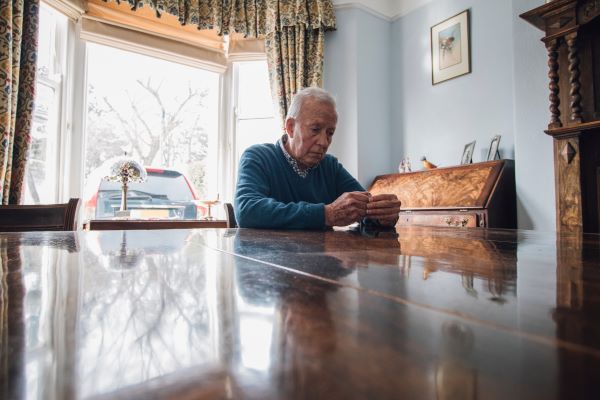Have you noticed that your mom is having difficulty falling asleep and is losing interest in socializing with friends? Is your dad hardly smiling and seems more irritable around your kids now? These are signs that your aging loved one might be struggling with depression. Although a majority of older adults are not depressed, seniors are at an increased risk for experiencing depression. As adults age, they might experience big life changes, such as the death of loved ones, retirement or declining health, which can sometimes trigger depression. Some estimates of major depression in older people living in the community range from less than 1 percent to about 5 percent but rise to 13.5 percent in those who require home health care and to 11.5 percent in older hospital patients, according to the Centers for Disease Control and Prevention (CDC). But depression is a treatable medical condition. If you know someone who has feelings of sadness or anxiety that last for weeks at a time, don’t let it go untreated. Here are four things you can do to help an aging parent who is depressed. Don’t Dismiss Signs and Symptoms Treating depression in the elderly starts with knowing the signs and symptoms. According to the CDC, depression red flags include:
- Feelings of hopelessness and/or pessimism
- Feelings of guilt, worthlessness and/or helplessness
- Irritability, restlessness
- Loss of interest in activities or hobbies once pleasurable
- Fatigue and decreased energy
- Difficulty concentrating, remembering details and making decisions
- Insomnia, early-morning wakefulness or excessive sleeping
- Overeating or appetite loss
- Thoughts of suicide, suicide attempts
- Persistent aches or pains, headaches, cramps or digestive problems that do not get better, even with treatment
However, these symptoms might be misdiagnosed and undertreated. Depression and dementia share many similar symptoms, including memory problems, sluggish speech and movements, and low motivation, so it can be difficult to tell the two apart. Depression can also be a side effect of many commonly prescribed drugs. If your parent feels depressed after starting a new medication, talk to their doctor. They may be able to lower the dose or switch it to another medication that doesn’t impact your parent’s mood. Talk About It If your father is living alone, has a dwindling social circle due to deaths or relocation, and decreased mobility due to driving retirement, don’t just start driving him everywhere. Recognize the significance of these life changes, and ask him about how he’s feeling about the loss. Then invite him to do activities together that he used to enjoy, whether that’s going on a walk through the park, taking an art class or going to the movies. You can offer direct comfort and support just by being a listening ear and doing things together that provide mental or physical stimulation. Counseling and therapy are also incredibly helpful because it addresses the underlying causes of the depression rather than just the symptoms. For example, if depression is causing your loved one to not sleep well, you could use it as a hook to discuss ideas about how to sleep better or longer, but therapy — whether supportive counseling, support groups or traditional therapy — can help them work through stressful life changes, heal from losses and process difficult emotions. Plan and Prep Healthy Meals Illness and disability, chronic or severe pain, cognitive decline, or damage to body image due to surgery or sickness can all be causes of depression in older adults. One of the ways you can help make a difference with their depression is to make sure they’re eating right. Focus on getting fruit, vegetables, whole grains and some protein at every meal. Encourage them to stay away from sugary and starchy comfort foods, which might offer a quick boost but then send blood sugar levels crashing. Even better, ask friends and family members to stop by and share meals with your loved one to help combat isolation and loneliness. Encourage Them to Follow Through with Treatment It’s not uncommon for seniors to ignore or hide their symptoms of depression. Whether they are sensitive to the stigma of mental health treatment or they neglect personal care, such as skipping meals or forgetting meds, help by seeing that your loved one gets an accurate diagnosis and appropriate treatment — then accompany them to appointments and offer moral support. Most older adults see an improvement in their symptoms when treated with antidepressants, therapy or a combination of both. If medications are prescribed, make sure your loved one takes them as directed and help them remember when to take their dose. If an elderly person you care about is depressed, you can make a difference by helping them find ways to stay engaged, encouraging them to adopt healthy habits, making sure they seek professional support and offering emotional support. With the right treatment and support, your parent can find themselves feeling more energetic and hopeful again.

